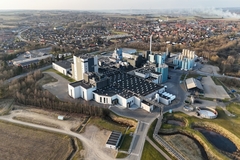
- Industry news
Industry news
- Category news
Category news
- Reports
- Key trends
- Multimedia
- Journal
- Events
- Suppliers
- Home
- Industry news
Industry news
- Category news
Category news
- Reports
- Key trends
- Multimedia
- Events
- Suppliers
Major Food Innovation Center Set to Open in South Korea

22 Dec 2014 --- The Korean Ministry of Agriculture, Food and Rural Affairs (MAFRA) (Minister Lee Dong-phil) held a briefing session to share the business results and future vision of Foodpolis (Korea National Food Cluster) with foreign correspondents and agricultural attaches of foreign embassies in Seoul.
The construction of the Foodpolis site, which will be the first of its kind in Asia, after Napa Valley of the United States, Food Valley of the Netherlands, and Emilia-Romagna of Italy, got underway in July, and is slated for primary completion in 2016. Foodpolis has signed MOUs with over 101 food businesses, both domestic and foreign, and the distribution of its land to domestic businesses begins in November.

At the briefing session, Lee Ju-myeong, Director General of MARFA, said “The market has registered a rapid growth and Korea has emerged as a best strategic location to export to China for two reasons: Korea lies adjacent to China and the recent signing of FTA with China”. He added that Foodpolis will offer the environment for the potential investors to use Foodpolis as a springboard for international expansion. “We already have signed MOUs with 101 countries, offer diversified incentives to boost foreign investment and the investors will get central governments’ landslide support. All these elements will surely position Foodpolis as the hub of Northeast Asian food markets” he added.
In a special lecture entitled “Food Market of South Korea: The Present and Future”, Professor Moon Jung-hoon of the Department of Agricultural Economics and Rural Development of Seoul National University said, “Northeast Asia, including South Korea, must become an attractive market for the world’s food businesses based on factors related to the growth of the food market, business environment, and domestic food trend.” In fact, Korea’s food market is growing at a rate of 6.7% a year, compared to the 3.2% growth rate of the global food market. In addition, it appears that Koreans’ eating habits, which are becoming westernized, as well as interest in health food, food quality and diversity, and briskness of online food retail is closely aligned with the trends of the global food market.
Foodpolis, based in Iksan, Jeollabuk-do, has a geographical advantage in that it is easily accessible from over 60 countries, including China and Japan, by a two-hour flight. Located on a land parcel of 3,580,000 square meters (358ha), Foodpolis will comprise the nearby city and the Food Industry Complex, equipped with business support and R&D centers such as the Food Quality & Safety Center, Food Functionality Evaluation Center, Food Packaging Center, Pilot Plant, Rental Plants, and Agency for Korea National Food Cluster. These facilities will provide technology and facilities associated with food safety, functionality, and packaging based on Korea’s world-class information technology. Foreign businesses in the Cluster will enjoy several privileges, including reduction and exemption of rent for 50 years and exemption from national tax for three years.
While the European food market is in decline, Northeast Asia, with a population of 1.5 billion, is expected to emerge as a new major food market, in connection with the fact that China is emerging as the world’s top food market. Thus, world-famous food businesses are increasingly targeting Asian markets, including China, and are paying particular attention to Foodpolis, the first food cluster in Asia.
The Korea National Food Cluster, which is a major project of the South Korean government, is expected to record 15 trillion KRW in sales, achieve 3 billion USD in exports a year, and create 22,000 new jobs by the time it reaches full operation in 2020. Aided by the government’s proactive support, its vision is to play a leading role in the Northeast Asian food market as one of the world’s top five food clusters.










